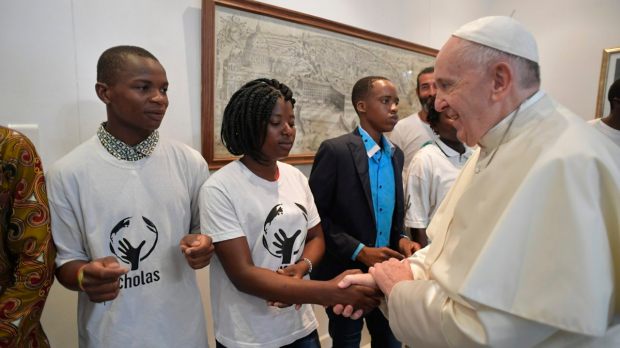Pope Francis addressed his foundation of young people today, reflecting on how the organization was “born of a crisis, but it did not raise its fists to fight against the culture, nor did it shrug its shoulders in resignation, or run away crying: ‘What a calamity, what terrible times!’ Instead it went out to listen to the heart of the young, to cultivate the new reality. ‘This isn’t working? Let’s look somewhere else.'”
This was the Holy Father’s reflection shared via video to a virtual event hosted by Scholas Occurrentes. Scholas was started with the support of the future pope some 20 years ago, when he was archbishop in Buenos Aires.
Now it is an international organization of pontifical right which aims to achieve the integration of students worldwide through technological, athletic, and artistic initiatives that promote education and the culture of encounter.
It is present in 190 countries and encompasses approximately half a million schools and multiple educational networks.
The Holy Father noted the growth in his message saying that “after all these years,” it is a “great joy to be able to call us a ‘community.’ A community of friends, a community of brothers and sisters.”
He said that the group started with two teachers and a crisis, along “with a little craziness and a little intuition. Something unplanned, that took shape along the way.”
He went on to offer three images from culture: the madman in Fellini’s “La Strada,” Caravaggio’s “The Calling of Matthew,” and Dostoyevsky’s “The Idiot.”
All three, he said, are stories of crisis where “most of all, human responsibility comes into play.” And, he continued, crises are needed in life, the way a growing plant needs a bigger pot. It would be a “poor humanity,” Francis said, if there were never any crises that make us grow, a “sedated humanity.”
Nevertheless, the pope warned, crisis needs wisdom:
On the other hand, just as crisis led to our founding by calling us into the open, danger comes when we are not taught how to relate to that openness. This is why crises, if they are not well accompanied, are dangerous, as one can become disorientated. And it is wise counsel, even for small crises, personal, marital and social ones, “never to go into a crisis alone: go in company.”
Without this accompaniment, he said, we become overcome by the fear of the crisis and close ourselves off, “losing our beauty … This beauty that, as Dostoevsky said, will save the world.”
The pope said that Scholas is meant to look at the “cracks in the world” to see what they are opening up to.
“And this means educating. Either education involves listening, or it does not educate. Education creates culture, or it does not educate. Education teaches us to celebrate, or it does not educate.
Some might say to me, “But what do you mean? Isn’t education about knowing things?” No. That is knowledge. But educating is listening, creating culture, celebrating.”
He reflected:
In Scholas I have seen Japanese teachers and students dancing with Colombians. It’s impossible! Yet I saw them. I saw the young people of Israel playing with those of Palestine. I saw them. Students from Haiti thinking alongside those of Dubai. Children from Mozambique painting with children from Portugal… I saw, between East and West, an olive tree creating a culture of encounter.Therefore, in this new crisis that humanity is facing today, where culture has been shown to have lost its vitality, I want to celebrate that Scholas, as a community that educates, as an intuition that grows, opens the doors of the Universidad del Sentido, the University of Meaning. Because to educate is to seek the meaning of things. It is to teach to look for the meaning of things.Bringing together the dream of children and young people with the experience of adults and the elderly. This encounter must always take place as otherwise there is no humanity, because there are no roots, no history, no promise, no growth, no dreams, no prophecy.Students from all situations, of languages and beliefs, because no one is left out when what is taught is not one thing only, but Life. The same life that originates and will always originate other worlds. Different worlds, unique, as we are also. In our deepest pains, joys, desires and nostalgia. Worlds of Gratuitousness, of Meaning, and of Beauty. “The Idiot,” the “Calling” of Caravaggio and the madman in “La Strada.”Never forget these last three words: gratuitousness, meaning and beauty. They may seem useless, especially nowadays. Who starts a business looking for gratuitousness, meaning, and beauty? They do not produce, they does not produce. And yet, the whole of humanity, the future, depend upon on these things that seem useless.

Read more:
How a midlife crisis can lead to sanctity

